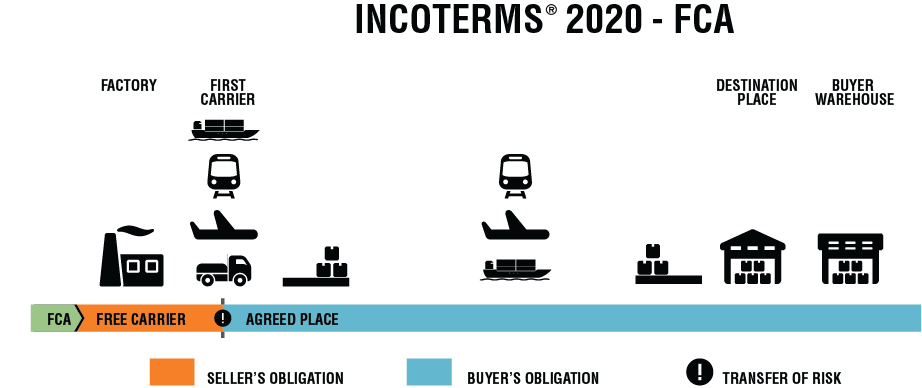FCA – Free Carrier (Incoterms 2020)
Definition
The FCA (Free Carrier) rule requires the seller to deliver the goods to the buyer or its carrier either at the seller’s premises loaded onto the collecting vehicle or delivered to another premises (typically a forwarder’s warehouse, airport or container terminal) not unloaded from the seller’s vehicle. The seller must carry out any export formalities and the buyer carries out any import formalities. From this it can be seen as a step up from the largely unworkable EXW in that the seller is now responsible for physically handing the goods over with risk transferring to the buyer only when delivery has been made, This rule works well for land transport within the Europe/Central Asia landmass, because often the truck collecting the goods will be the one transporting the goods to the destination.
Revisions under Incoterms 2020
The Free Carrier (FCA) Incoterms® 2020 Rule pushes the responsibility of delivering the goods to the buyers nominated premises onto the seller, so they have to organise shipping and various export documents.
Free Carrier (FCA) has been revised for Incoterms® 2020 to cater to a situation where goods are sold FCA for carriage by sea and buyer or seller (or either party’s bank) requests a bill of lading with an on-board notation. FCA in article A6/B6 now provides for the parties to agree that the buyer will instruct the carrier to issue an on-board bill of lading to the seller once the goods have been loaded on board, and for the seller then to tender the document to the buyer (often through the banks).
Basics
Traders can use an FCA to describe any transportation point, regardless of the number of transportation modes involved in the shipping process. The point must be a location within the seller’s home country, however.
Liability for the merchandise transfers from the seller to the carrier or buyer at the time the seller delivers the goods to the agreed port or area. The seller is only responsible for delivery to the specified destination as part of the liability transfer. It isn’t obligated to unload the goods, but the seller might be responsible for ensuring that the goods have been cleared for export out of the U.S. if the destination is the seller’s premises.
The buyer doesn’t have to deal with export details and licenses, because this is the responsibility of the seller. The buyer must arrange for transport, however.
Where Is The “Named Place For Handing Over Responsibility” From The Seller To The Buyer?
The seller is liable and responsible for all tasks in their country up until the goods are delivered to the carrier at the named place, usually the terminal or a warehouse (e.g. consolidation centre). Unless the named place is the terminal, the buyer will be liable and responsible for some tasks in the export country.
Free Carrier Seller and Buyer Obligations / Responsibilities

Comparison to Ex Works (EXW)
FCA overcomes the disadvantages of EXW, where the buyer is in a worse position than the seller for arranging local transport and customs.
FCA – Free Carrier Transportation Options
The ICC has divided the 11 Incoterms into those that can be used for any mode of transportation and those that should only be used for transport by “sea and inland waterway.” That’s because companies were too often choosing Incoterms where risk and responsibilities transferred at a point that made no sense in a non-ocean journey.
Under Incoterms 2020, FCA can be used for any mode of transport—air, courier, truck, rail, vessel or multi-modal shipments.
Examples
The seller delivers the goods to the cited destination. The shipper assumes responsibility for the goods when they arrive there. The seller would be responsible for loading the goods for transport.
For example, Joe Seller ships goods to Bob Buyer. Bob opts to use his shipper with whom he’s done business before. Joe agrees, and it’s his responsibility to deliver the goods to the shipper. At this point, all liability passes to Bob.
Seller arranges pre-carriage from seller’s depot to the named place, which can be a terminal or transport hub, forwarder’s warehouse etc. Delivery and transfer of risk takes place when the truck or other vehicle arrives at this place, ready for unloading – in other words, the carrier is responsible for unloading the goods. (If there is more than one carrier, then risk transfers on delivery to the first carrier.) Where the named place is the seller’s premises, then the seller is responsible for loading the goods onto the truck etc. NB this is an important difference from Ex Works EXW
Advantages and Disadvantages of FCA – Free Carrier
The first version of this rule appeared in Incoterms® 1980 to take into account container and roll on-roll off transport by sea as well as transport by air, road and rail. It absorbed the previous FOR/FOT (Free on Rail/Free on Truck, “truck” referring to a railway wagon not a road transport vehicle) appearing in the 1953 version to take into account the development of the rail freight network in Europe post World War Two, and FOB Airport which had originally appeared in the 1976 version to cater for the then new era of larger more powerful aircraft being able to carry cargo in addition to the passengers’ baggage. For some strange reason, in the Incoterms® 1990 version FCA’s delivery article was expanded to detail specific delivery procedures for rail transport, road transport (not mentioned in any previous versions), inland waterway, sea transport, air transport, unnamed transport (!) and multimodal transport. Sensibly Incoterms® 2000 revised this again to allow the current two options of delivery: loaded at the seller’s premises; or not unloaded elsewhere, typically at the carrier’s premises.
While initially seeming similar to EXW, FCA is in fact the more practical rule to use both in domestic and in international cross-border trades where the seller wants to minimise its effort and costs.
The seller must load the goods onto the buyer’s means of transport. This means that in most cases the buyer’s truck or its carrier’s truck backs up to the seller’s loading dock and the seller’s staff and equipment complete the loading. Depending on local rules and regulations, it would usually then be the truck driver’s responsibility to ensure that the load is secured on his truck, but this occurs after the seller has loaded the goods.
FCA is available for both domestic and international transactions.
If the transaction is an international trade then the seller will need to complete any export formalities required by its country’s authorities. This usually will mean that the buyer must inform the seller of the means of transport from the seller’s country, whether by road, rail, air or sea. The seller will usually need to know from the buyer the name and contact details of its carrier, the freight booking information including reference number/s, and any relevant data such as truck registration, railcar number, the flight details or the vessel’s details so that it can correctly declare both the date of export and the means of export to its authorities. The seller can outsource this task to the buyer’s carrier if they agree, at the seller’s cost.
Should the buyer fail to advise the seller about the carrier’s details, and fail to advise the booking details either via their carrier or themselves, the buyer will have no recourse on the seller and likely will have breached the contract. Similarly, if the buyer or its carrier fail to collect the goods at the agreed time and place, the buyer likely will have breached the contrac
The seller will of course build into its selling price the estimated costs of loading the goods and carrying out the export formalities, plus no doubt a positive margin of error in case they cost more than initially anticipated, a margin to take into account its administrative costs and quite likely a profit margin which after all it is entitled to do on any costs which are an input when determining its selling price. The costs of all these and its original ex works price are hidden from the buyer, simply being bundled into the one FCA price.
The seller is comforted by the knowledge that once it has delivered the goods, either at its own premises or those of the buyer’s nominated person or carrier, its risk for loss or damage of the goods has finished. If the truck used by the buyer’s carrier to collect the goods from the seller has an accident at the first corner after leaving the seller’s premises and the goods are damaged, or even if that truck has an electrical fault causing it to burst into flames at the seller’s loading dock immediately after loading has been completed, and damaging or destroying those goods, nevertheless the seller has delivered and is entitled to be paid for the goods.
In an export transaction using FCA the seller usually need not add VAT/GST to its sale, though it might require some form of evidence of export from the buyer to justify this action to its country’s tax authorities.
Free Carrier and Bills of Lading
The most significant change in Incoterms 2020 rules relates to FCA. Under this term, the buyer can now instruct its carrier to issue a bill of lading with an on-board notation to the seller so that the seller may satisfy the terms of a letter of credit.
Under an F-group rule, the “at a named place” is on the seller’s side, but the buyer hires the main carrier and freight forwarder. The seller does not control shipments under the F term, so the freight forwarder and carrier have no obligation to the seller.
This has caused problems in the past when selling under a letter of credit, because international carriers would have no reason to provide the bill of lading to the seller who would typically need it to get paid under a letter of credit.
The FCA Incoterms 2020 rule provides a potential solution—the buyer and seller may agree in the sales contract that the buyer must instruct the carrier to provide the seller with an on-board transportation document.
While the buyer may instruct the carrier to provide the required bill of lading to the seller, there is no guarantee the carrier will comply. Even if they do, they will not issue the document before the goods are actually loaded, which may cause delays for the seller to get paid under the letter of credit.
FCA Tips And Tricks
If the named place is a forwarder’s warehouse or some other terminal that is not the seaport or airport, the seller remains liable and responsible for loading the truck at their premises, with the carrier responsible for unloading the truck at the named place. The buyer is therefore liable and responsible for some tasks in the export country (transportation and terminal charges).
The named place can also be the supplier’s factory, making it similar to EXW, excepting the supplier is responsible for loading the truck. The buyer is therefore liable and responsible for some tasks in the export country (transportation and terminal charges).
Irrespective of where the named place is, the seller is still responsible for all export and documentation tasks. There’s one exception, which is relevant only for letter of credit payments: the buyer can now instruct the carrier to add the word “aboard” onto the Bill of Lading.

